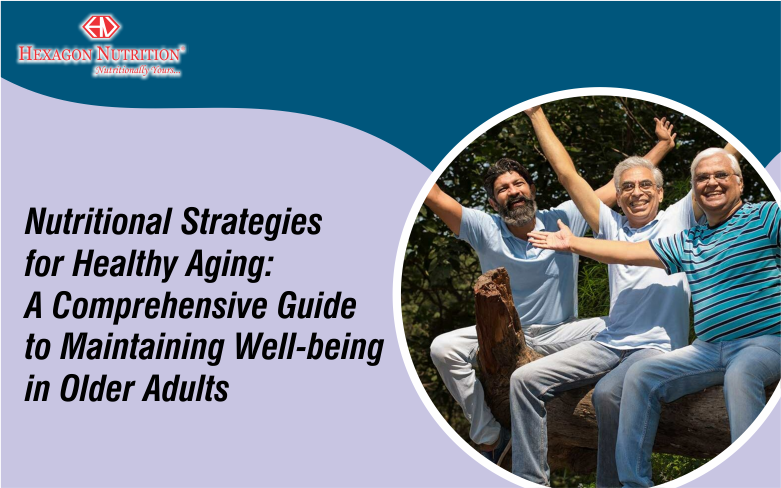
Introduction:
As the global population continues to age, there is an increasing emphasis on adopting effective nutritional strategies to promote healthy aging and well-being in older adults. The intersection of nutrition and aging is a critical area of study, recognizing the profound impact that diet can have on various aspects of physical and mental health as individuals grow older. This comprehensive guide delves into the nuanced considerations for designing nutritional plans tailored to the unique needs of older adults, aiming to address specific challenges and promote optimal health outcomes. From managing chronic conditions to supporting cognitive function, this guide explores a holistic approach to nutrition, offering insights into key nutrients, dietary patterns, and lifestyle choices that can contribute to the maintenance of well-being and vitality in the aging population. Understanding and implementing these nutritional strategies is essential for fostering a proactive approach to aging, empowering older adults to lead fulfilling and healthy lives.
Top of FormAs we age, the significance of maintaining a healthy diet becomes even more crucial for sustaining overall well-being and preventing age-related health issues. Healthy eating for older individuals is not merely a matter of sustenance but a key component in fostering vitality, managing chronic conditions, and promoting a high quality of life. One of the primary considerations for older adults is maintaining a balanced and nutrient-dense diet that meets the changing needs of the aging body.
Protein- The Elixir of Strength:
As the years unfold, maintaining muscle mass becomes paramount. Protein, often underestimated in the diets of older adults, is a key player in preserving strength and physical function. Lean meats, poultry, fish, eggs, dairy, legumes, and nuts are potent sources of protein that should grace the plates of those navigating the golden years.
Whole Grains:
The Foundation of Wellness: Whole grains, with their complex carbohydrates, provide sustained energy and is a crucial component of a heart-healthy diet. Incorporating foods like brown rice, quinoa, and oats not only contributes to cardiovascular well-being but also supports digestive health through their fiber content. Fiber is particularly important in preventing constipation, a common issue among the elderly.
Mindful Hydration:
As the body ages, the sensation of thirst may become less pronounced. Therefore, making a conscious effort to stay adequately hydrated is essential. Proper hydration not only supports organ function and joint health but also aids in maintaining cognitive performance.
A Symphony of Nutrients:
In the grand orchestration of health, older adults benefit immensely from a diet that prioritizes nutrient density. This means incorporating a vibrant array of fruits, vegetables, whole grains, lean proteins, and healthy fats. These foods provide a rich tapestry of vitamins, minerals, antioxidants, and fiber essential for supporting immune function, bone health, and cognitive well-being.
Micro-Miracles for Health:
Calcium and vitamin D take center stage in promoting bone health, with sources ranging from dairy products to fortified foods and sunlight exposure. Omega-3 fatty acids, found in fatty fish like salmon and flaxseeds, offer a double benefit by supporting heart health and potentially enhancing cognitive function.
Portion Control:
A Symphony of Balance: With metabolism gradually slowing down, portion control becomes an art form. Smaller, well-balanced meals ensure adequate nutrition without excessive caloric intake, supporting weight management and overall health.
Culinary Wisdom:
The kitchen becomes a haven for wellness, where cooking methods matter as much as the ingredients. Opting for grilling, baking, or steaming over frying helps retain the nutritional integrity of foods while minimizing saturated fat intake.
The Social Banquet:
Beyond the physical aspects, the act of eating becomes a social and emotional experience. Sharing meals with friends and family fosters a sense of community, combats loneliness, and contributes to positive mental and emotional well-being.
Tips for a healthy life as you grow older:
-It’s essential for older adults to be mindful of specific health conditions that may require dietary modifications. For example, individuals with diabetes should manage their carbohydrate intake, and those with hypertension should monitor their salt consumption.
-Culinary choices also play a role in healthy aging. Opting for cooking methods like grilling, baking, or steaming instead of frying helps retain the nutritional value of foods while reducing the intake of saturated fats.
-Beyond the physical aspects, healthy eating for older individuals has profound effects on mental and emotional well-being. Sharing meals with friends and family can foster a sense of community, combat feelings of loneliness, and contribute to a positive outlook on life.
– Special attention should be given to micronutrients that play a significant role in age-related health concerns. Calcium and vitamin D are vital for bone health and can be sourced from dairy products, fortified foods, and sunlight exposure. Omega-3 fatty acids, found in fatty fish like salmon and flaxseeds, contribute to heart health and may have cognitive benefits.
-As the tapestry of life unfolds, so do the nutritional needs of our bodies. Aging gracefully involves more than just the passage of time; it requires a mindful and nourishing approach to diet. In the realm of healthy eating for older individuals, every meal becomes an opportunity to celebrate well-being and vitality.
Conclusion:
In summary, healthy eating for older people is a symphony of gastronomic options that extends beyond the act of absorbing calories. It is a comprehensive approach to nutrition that considers the changing needs of the aging body and addresses specific health concerns. By eating nutrient-dense foods, staying hydrated, and living a healthy lifestyle, older folks can enjoy their golden years with vitality, resilience, and a profound sense of well-being. To put it simply, it entails a careful approach to diet that takes into account the changing needs of the aging body as well as unique health concerns. Older folks can nurture their well-being, improve their quality of life, and enjoy the golden years with vitality and elegance by eating nutrient-dense foods, staying hydrated, and leading a healthy lifestyle.



